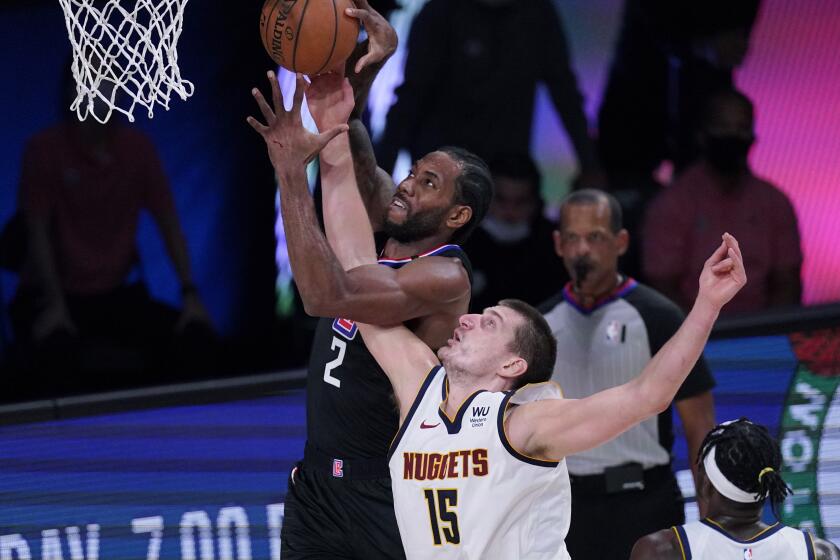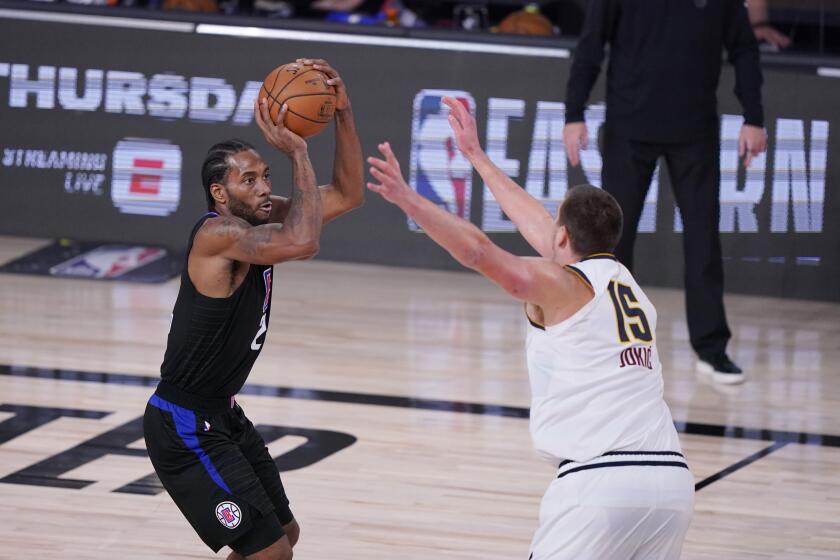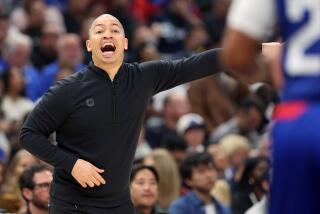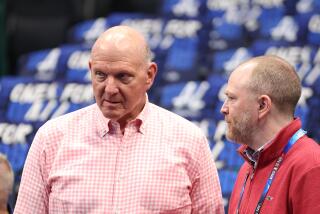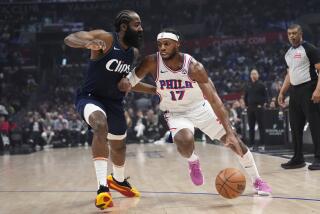What went wrong for Clippers? And where do they go now?
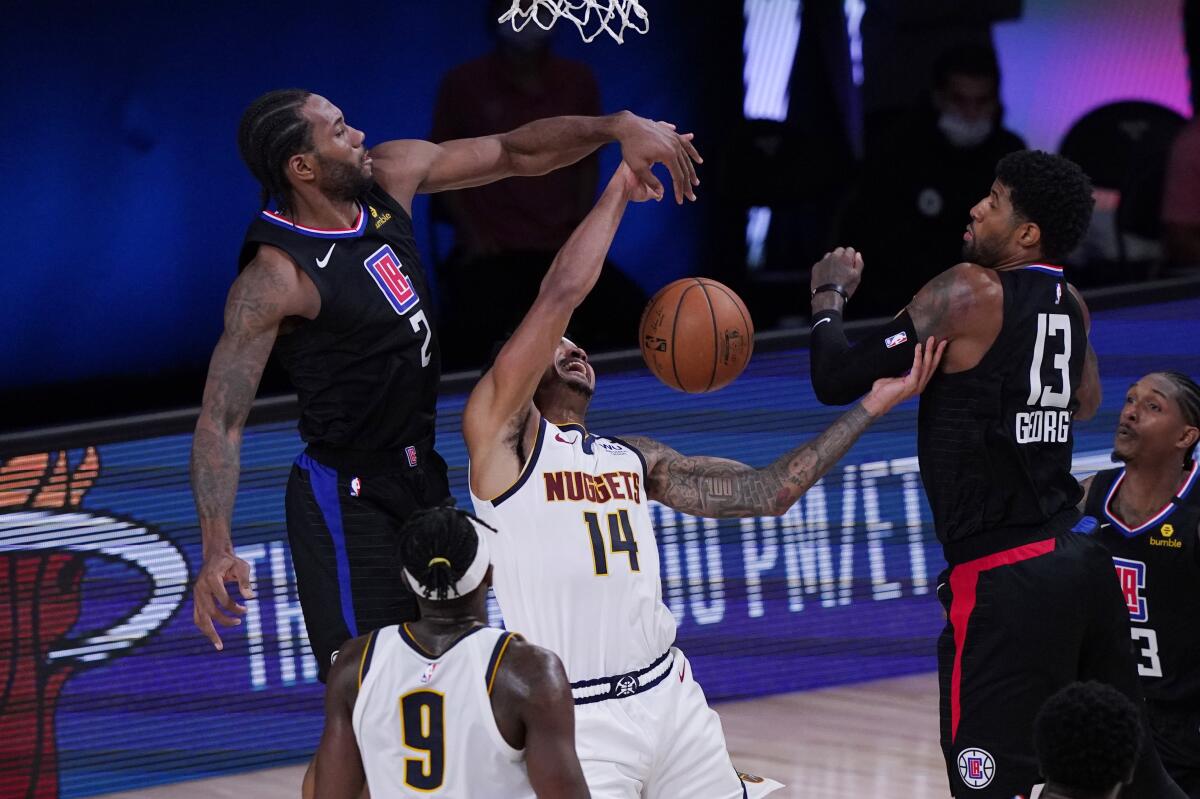
- Share via
Nine months before the Nuggets ended the Clippers’ season, they were sending their visitors from Los Angeles to their sixth loss in 13 games on a crisp January night. By the end, Doc Rivers’ patience was as thin as the Rocky Mountain air.
After voicing his frustration over two decisions by the officials, the Clippers’ coach was whistled for two technical fouls, ejected and led off Pepsi Center’s court with just over a minute remaining.
The loss capped a stretch featuring some of championship contender’s most head-scratching play of its highly anticipated season, including a 26-point loss on Jan. 4 that led backup center Montrezl Harrell to deduce that “we’re not a great team.” They were not good enough to win in Denver, either, Rivers acknowledged, saying the team had waited too long to begin playing. Still, he insisted the team was on the same page.
“None of us in there are panicking or anything like that,” Rivers said. “It’s a long season. And we’ll be ready.”
The season would last four months longer than ever because of the interruption caused by the COVID-19 pandemic. Yet all that time couldn’t help the Clippers be ready, when it mattered most, to clean up the streaky play that was a hallmark not only during early January but much of the season.
Pushed by the Nuggets again in a Western Conference semifinal, the Clippers saw their commanding 3-1 series lead disappear in a run of missed shots, missed stops and missed opportunities that revealed that their inconsistency was still present months later. They flexed their championship potential while building leads of 16, 19 and 12 points against the Nuggets in the series’ final three games. They also looked helpless when Denver began its rallies.
“They ran into a real team that played together, not in spite of each other,” said one league executive.
The earlier-than-predicted exit keeps the franchise from realizing its stated goal of a claiming a championship and leaves them watching as the rival Lakers continue to pursue their own.
Following another postseason collapse, the Clippers’ front office needs to work fast since star Kawhi Leonard can walk after next season.
Chris Webber, the TNT analyst and former All-Star, was among the many who picked the Clippers to win the West based on the tantalizing promise of adding two-time Finals most valuable player Kawhi Leonard and former most valuable player candidate Paul George to a lineup of established, resilient, versatile players who excelled in their roles.
“You thought that chemistry would just be in their effort and defense every night,” Webber said.
Instead, a lack of chemistry was repeatedly cited by players after Game 7 as a key factor in why they fell short when their sheer talent failed to overwhelm opponents.
The Clippers averaged only 45 points and 39% shooting in second halves against Denver, figures that ranked last among all eight conference semifinalists. George and Leonard took 11 shots and missed them all in the fourth quarter of Game 7 and combined for just five points after halftime.
“We start missing shots and you can see us trusting less and less and less,” Rivers said. “I mean, listen, obviously I could have done something more.”
From the start of the Leonard and George partnership it was understood that integrating face-of-the-franchise stars known for lead-by-example styles into an established locker-room hierarchy would take time. The most influential voices from the previous year, such as Lou Williams, Patrick Beverley and Harrell, remained. They sought to kick-start that process. Before training camp began, the Clippers had already played pickup games for weeks, chartered a boat for a deep-sea fishing trip and watched a Rams game from a suite at the Coliseum. Inside the league’s bubble last month, players said they grew closer while debating whether the team should continue the season because of concerns over racial injustice.
Still, meshing proved more difficult than expected as players’ roles changed.
“You go from last year, we were the team that wasn’t expected to make the playoffs to going and being a championship-caliber team when you bring in two high-level guys, that’s an adjustment,” Williams said. “[Harrell] and I we had to adjust our games. I think everybody had to sacrifice and put themselves in a different position and that type of thing takes time, especially when you’re doing it for years at a time.
“For Kawhi, he just won a championship with a completely different group of guys, to come here. Paul was in a different situation. There was so many different moving parts.”
That included their rotations too. Their first game with a healthy roster was Christmas. They played with a full roster 19 times. A common problem, Williams said, was finding players used to different systems of offense and defense in the wrong spots. Leonard said the team needed “better basketball IQ” entering next season.
Yet after the January loss in Denver, the Clippers won nine of their next 11 games and won seven of eight through the first week of March, including a blistering performance against Denver at Staples Center. Just as they were rolling, with midseason acquisitions Marcus Morris Sr., Reggie Jackson and Joakim Noah in the fold, the coronavirus shut down the season.
The Clippers implored each other to “win the wait” during the league’s four months off, but the wait for rhythm continued even when the NBA reconvened in Orlando, Fla. Center Ivica Zubac and guard Landry Shamet arrived more than two weeks late after testing positive for COVID-19. Williams, Beverley and Harrell all left the bubble to mourn the loss of loved ones. Harrell was gone for nearly one month, returning just before the playoffs.
“Guys had to go home for rightful reasons,” George said. “We just missed a lot of time being together with injuries in the regular season and inside the bubble. So we didn’t get much time to be together. This was the longest stretch I think that we had played together. But it just wasn’t enough and I think in this series, it showed. Denver is a team that been playing together for along time. When things got rough, when they needed this or needed that, they just know each other.”
Reggie Miller, the Hall of Fame guard and TNT analyst, said Wednesday that George “needs to start looking at himself” in part for his postgame comment that the past season had not been considered championship-or-bust.
“This team was built to win this year,” Miller said. “You can’t tell me it was all about chemistry. Their cross-town rival has a brand-new coach in Frank Vogel. They’ve got, what six, seven new players as well? Avery Bradley is not even in the bubble? … So everyone’s dealing with chemistry in the restart.”
Following Tuesday’s loss in Game 7, Rivers acknowledged clearly falling short of expectations and that he would “take any blame for it.” Rivers was lauded for his impassioned postgame speech in August decrying racism. More recently, however, he has been heavily criticized for his lineup usage and adjustments.
Despite the Clippers’ early exit, their roster is still top-loaded with talent and expected to be among the top contenders in the West next season. The league executive believed the Clippers would bring back much of the same team into 2021, calling it the course he would take, as well. The Clippers can use a midlevel exception in free agency.
The Clippers, the executive said, should pair Leonard with the quality of point-guard playmaker he played alongside while winning championships with San Antonio and Toronto. It is one of several upgrades needed if their championship dreams are to become reality in 2021.
Another second-half collapse led the Clippers falling to the Nuggets in Game 7 of their series Tuesday night. Here are five takeaways from the series.
“Running it back is great, but the Clippers are beatable,” the executive said. “They need a point guard. They’ve got to get one. They need better chemistry. They’ve got to do a better job scheming and adjusting.”
Who’s back:
G Patrick Beverley (7.9 points, 5.2 rebounds, second-team all-defense)
F Kawhi Leonard (career-high 27.1 points and 4.9 assists, 7.1 rebounds, second-team all-NBA and all-defense)
F Paul George (21.5 points, 5.7 rebounds, 3.9 assists)
G Terance Mann (2.4 points, 1.3 assists as a rookie)
G Rodney McGruder (3.3 points, 2.7 rebounds)
C Joakim Noah (2021 contract is nonguaranteed)
G Landry Shamet (9.3 points, 37.5% three-point shooting)
C Mfiondu Kabengele (3.5 points in 12 appearances; rookie spent most of season in G League)
G Lou Williams (entering final season of contract)
C Ivica Zubac (8.3 points, 7.5 rebounds, career-high 10 double-doubles)
Who might be gone:
F Marcus Morris Sr., unrestricted free agent (10.1 points, 4.1 rebounds, 42% shooting)
F JaMychal Green, $5-million player option for 2021 (6.8 points, 6.2 rebounds, 38% three-point shooting)
F/C Montrezl Harrell, unrestricted free agent (18.6 points, 7.1 rebounds)
G Reggie Jackson, unrestricted free agent (9.5 points, 3.2 assists)
F Patrick Patterson, unrestricted free agent (4.9 points, 2.6 rebounds)
What about the draft?
The Clippers traded their 2020 first-round pick to New York, in February, in exchange for Morris, and traded five draft picks through 2026, plus two pick swaps, in exchange for George.
Greif reported from Los Angeles.
More to Read
Get our high school sports newsletter
Prep Rally is devoted to the SoCal high school sports experience, bringing you scores, stories and a behind-the-scenes look at what makes prep sports so popular.
You may occasionally receive promotional content from the Los Angeles Times.

